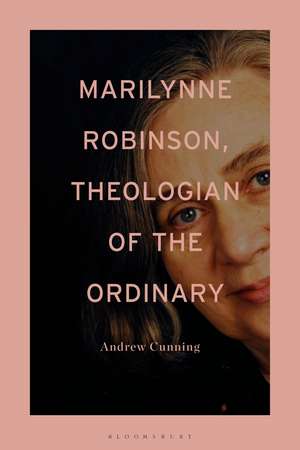Marilynne Robinson, Theologian of the Ordinary
Autor Dr Andrew Cunningen Limba Engleză Paperback – 29 iun 2022
| Toate formatele și edițiile | Preț | Express |
|---|---|---|
| Paperback (1) | 196.61 lei 6-8 săpt. | |
| Bloomsbury Publishing – 29 iun 2022 | 196.61 lei 6-8 săpt. | |
| Hardback (1) | 538.61 lei 6-8 săpt. | |
| Bloomsbury Publishing – 23 dec 2020 | 538.61 lei 6-8 săpt. |
Preț: 196.61 lei
Preț vechi: 257.25 lei
-24% Nou
Puncte Express: 295
Preț estimativ în valută:
37.63€ • 40.86$ • 31.61£
37.63€ • 40.86$ • 31.61£
Carte tipărită la comandă
Livrare economică 23 aprilie-07 mai
Preluare comenzi: 021 569.72.76
Specificații
ISBN-13: 9781501371349
ISBN-10: 1501371347
Pagini: 208
Dimensiuni: 152 x 229 mm
Greutate: 0.28 kg
Editura: Bloomsbury Publishing
Colecția Bloomsbury Academic
Locul publicării:New York, United States
ISBN-10: 1501371347
Pagini: 208
Dimensiuni: 152 x 229 mm
Greutate: 0.28 kg
Editura: Bloomsbury Publishing
Colecția Bloomsbury Academic
Locul publicării:New York, United States
Caracteristici
Incorporates readings of never-before-seen notes, drafts and letters from Yale University's Marilynne Robinson archive
Notă biografică
Andrew Cunning is a theologian and writer in Belfast, Northern Ireland, UK. He has taught at Queen's University Belfast and the University of Limerick.
Cuprins
AcknowledgementsIntroduction1. Marilynne Robinson, the American Ordinary and Housekeeping2. Gilead and the intersection of language3. Home: Robinson's radical grace4. Lila: The myth of the self 5. Reflections on the Ordinary: An interview with Marilynne RobinsonReferencesIndex
Recenzii
Marilynne Robinson, Theologian of the Ordinary demonstrates the theological richness of Robinson's fiction and highlights its theological potential. Cunning charts new directions in Robinson studies for the imaginative to enliven the theological, to their mutual enrichment.
Cunning's wonderfully attentive and illuminating readings of Robinson's novels represent a key contribution to our understanding of her work as a theology of the exceptional ordinary.
Marilynne Robinson is a rare writer, one who combines an astringent and dazzling intellectual precision with deep compassion and a hard won belief in hope. In Andrew Cunning's book she receives the kind of critical reading that her work deserves: alert, attentive and attuned to the ways in which her theology of the everyday, and especially the drama of grace, is at play in everything that she writes. This is a fine study that does justice to its subject and makes an excellent contribution to the fields of American literature and religious studies.
Like the lake which features so significantly in Marilynne Robinson's first novel, her fiction combines a level, luminous surface with a depth of disturbed and elusive memory. Andrew Cunning helps us see a bit further into that depth, into the bewildering strangeness of the 'ordinary' - mapping out Robinson's continuities with 19th-century American literary and philosophical themes, illuminating what she thinks about language, narrative, selfhood and myth, and pursuing her subtle and many-sided engagement with the Calvinist tradition. It is a careful, intelligent, original book, a really significant contribution to the understanding of this remarkable thinker and storyteller.
Cunning's wonderfully attentive and illuminating readings of Robinson's novels represent a key contribution to our understanding of her work as a theology of the exceptional ordinary.
Marilynne Robinson is a rare writer, one who combines an astringent and dazzling intellectual precision with deep compassion and a hard won belief in hope. In Andrew Cunning's book she receives the kind of critical reading that her work deserves: alert, attentive and attuned to the ways in which her theology of the everyday, and especially the drama of grace, is at play in everything that she writes. This is a fine study that does justice to its subject and makes an excellent contribution to the fields of American literature and religious studies.
Like the lake which features so significantly in Marilynne Robinson's first novel, her fiction combines a level, luminous surface with a depth of disturbed and elusive memory. Andrew Cunning helps us see a bit further into that depth, into the bewildering strangeness of the 'ordinary' - mapping out Robinson's continuities with 19th-century American literary and philosophical themes, illuminating what she thinks about language, narrative, selfhood and myth, and pursuing her subtle and many-sided engagement with the Calvinist tradition. It is a careful, intelligent, original book, a really significant contribution to the understanding of this remarkable thinker and storyteller.
